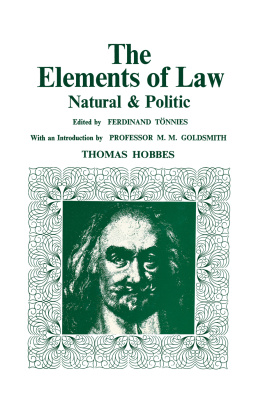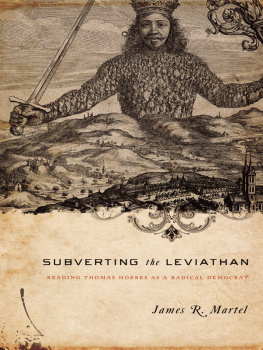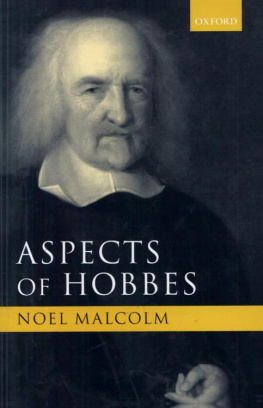First published 1889 by
FRANK CASS AND COMPANY LIMITED
Published 2013 by Routledge
2 Park Square, Milton Park, Abingdon, Oxon OX14 4RN
711 Third Avenue, New York, NY, 10017, USA
Routledge is an imprint of the Taylor & Francis Group, an informa business
Frank Cass 1969
ISBN 13: 978-0-714-62540-9 (hbk)
All rights reserved. No part of this publication may be reproduced, stored in a retrieval system, or transmitted, in any form, or by any means, electronic, mechanical, photocopying, recording or otherwise, without the prior permission of the publisher.
I N 1889, Ferdinand Tnnies published versions of two works by Thomas Hobbes. His editions of The Elements of Law, Natural and Politic and of Behemoth; or The Long Parliament were the first modern critical editions, based on manuscripts, of works by Hobbes; so far, they are the only ones.
Behemoth, written by 1668 when he was seventy, was Hobbess last controversial word about the Civil Wars. In four dialogues, he reviews the events of the Great Rebellion and reasserts his own doctrines.
Hobbess earliest statement of his doctrines is The Elements of Law. Completed in 1640, it was his first systematic political work. Trouble was at hand; his little Treatise in English demonstrating that the rights disputed by the Short Parliament were inseparably part of the right of sovereignty, was dated May 9, 1640four days after Parliament had been dissolved. When the Long Parliament met in November, Hobbes left England. Fifty-two and a philosopher, he refused to chance Parliaments hostility to those who had written for the King; he became the first of all that fled. He may have been excessively cautious, overly timid in fearing a House of Commons far more eager to send Strafford and Laud to the Tower and to hell, than it was to set Hobbes on the pillory or in Newgate. In expecting punishment, perhaps he thought too highly of his treatisehe claimed that he had laid down the foundation of a science of politics. His solid structure would dispel the political chimeras of the parliamentarians. But Pym and his allies could scarcely have been deflected by even the most definitive refutation; they would not have accepted it even if they had not been too busy acting on their own ideas to notice.
By the autumn of 1640, England was headed for civil war. The Scots had covenanted to extirpate episcopacy; they had rebelled. King Charles had twice attempted to put down their rebellion; he had twice failed. The Short Parliament had refused to vote money for coercing the Scots before considering their grievancesillegal taxation, arbitrary government, prerogative courts, and a corrupt church. There was no reason to suppose that the Parliament meeting on November 3 would be less recalcitrant.
When Hobbes fled, he had published The Elements of Law only by circulating it in manuscript. In 1649 and 1650, a corrupt copy, broken into two separate tracts, was printed in London, probably without Hobbess participation. From these incorrect versions were printed the copies that appeared in The Moral and Political Works of Thomas Hobbes (1750) and Sir William Molesworths collected edition, The English Works of Thomas Hobbes of Malmesbury (183945). Only when Tnnies published, did The Elements of Law become available in its original form. Tnniess edition was based not only on the printed version but also on manuscript copiesincluding one that seems to have been Hobbess working copy. Tonniess notes display Hobbess revisions, including a few that are important.
The Elements of Law helps us see Hobbess mind at work, for it is the first version of his later political works. In many cases, the same passage can be traced from The Elements of Law through De Cive to its final form in Leviathan. For example, Hobbes explains, in Part I, Chap. xix, Sec. 5 (pp. 102103) of The Elements of Law, how men differ from other social animals. Bees naturally form societies; why cannot men do so too? But (1) animals do not compete for status; (2) they cannot differentiate their own good from the common good; (3) they are incapable of discovering faults in the society; (4) being unable to speak, they cannot be seditious; (5) they are disturbed by pain but not by wrong; (6) they agree naturally, but men only artificially, by covenant. The explanation remains the same, the same reasons reappear, with only minor changes of wording and emphasis, in both De Cive, (v, 5) and Leviathan, (17).
The later works are not merely similar in content, they are also similar in structure. The Elements of Law must be regarded as a first draught of De Cive and Leviathan.
Elementorum Philosophiae, Sectio Tertia, De Cive was published in Paris in 1642. Hobbes dated the dedication November 1, 1641. De Cive was the third part, on society, of the philosophic system Hobbes had planned in the late 1630s. The first part was to be on body and its properties, the second, on man. He did not complete his project until 1658 when De Homine was published; De Corpore had appeared only three years earlier, in 1655.
De Cive was finished first because, as Hobbes explained (in the preface to the second edition in 1647), his country was boiling hot with questions concerning the rights of dominion and the obedience due from subjects, the true forerunners of an approaching war. De Cive is a revised, expanded Latin version of The Elements of Law. Hobbes left aside human nature, the subject of the first thirteen chapters of The Elements of Law. That would be dealt with in De Homine and Hobbes wanted to perfect his work on the problems of perception, especially in optics. He hoped to explain how external objects affected the senses and excited feelings of desire and aversion. Hobbes began De Cive with the subject treated in the fourteenth chapter of The Elements of Law: the description of the state of nature. There follow three chapters in The Elements of Law and two long ones in De Cive on the laws of nature, and then one on how the Holy Scriptures confirm the laws of nature. This brings us to The Elements of Law, , Chap. xix which corresponds to Chap. v of De Cive: the causes and first beginnings of civil government
Having arrived at the necessity for constituting a civil society, Hobbes continues with discussions of how a commonwealth is instituted (E.L. II, i; De C. vi); the forms of government (E.L. II, ii; De. C. vii); dominion despotical and dominion paternal (E.L. II, iii, iv; De C. viii, ix); a comparison of the various forms of government (E.L. II, v; De C. x). The Elements of Law then has two chapters (II, vi, vii) on the relation between revealed religion and obedience; De Cive has a brief chapter (xi) confirming what has been said from Scripture, but it postpones the treatment of revealed religion to its third part, Chapters xvxviii.
After this brief deviation, De Cive returns to the plan of The Elements of Law: both treat rebellion and the dissolution of the commonwealth, the duties of sovereigns, and the nature and kinds of laws (











